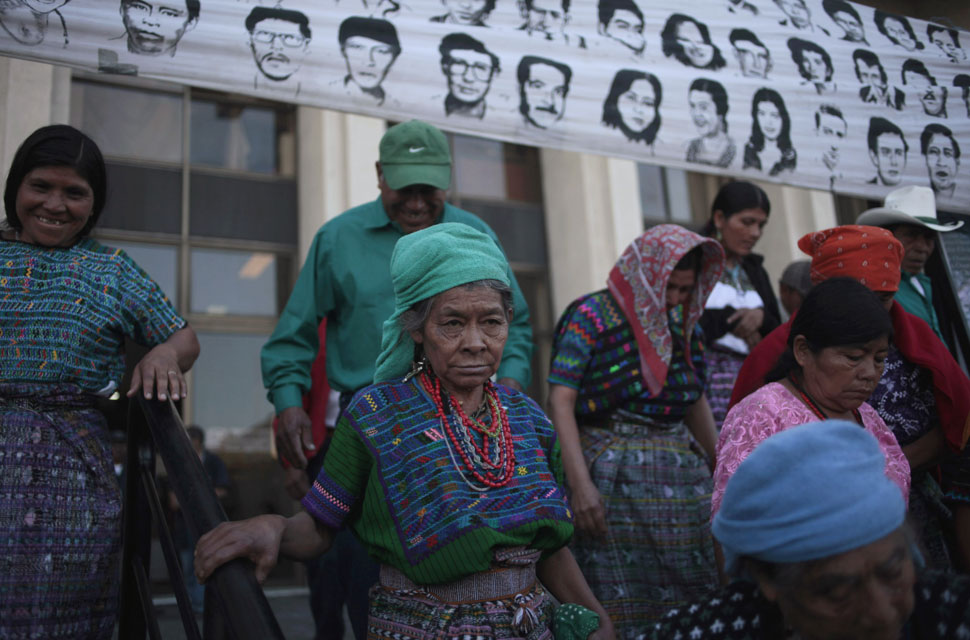A Chance for Justice in Guatemala
LAST Monday, a brave Guatemalan judge made history. In greenlighting a public trial for the former dictator Efraín Ríos Montt on charges of genocide, the judge, Miguel Ángel Gálvez, made his country the first in the Americas to prosecute a former head of state, in its own domestic courts, for the ultimate crime.

Indigenous Maya protesters outside Gen. Montt’s courtroom carry banners with the faces of “desaparecidos,” relatives who disappeared during his military era.
Mr. Ríos Montt, a former cold war general whom Ronald Reagan defended as having gotten a “bum rap,” will finally face his accusers — three decades after his alleged crimes, and a year after he was indicted.
Mr. Ríos Montt seized power by a coup in March 1982, taking charge of a counterinsurgency that was then two decades old. To deny the guerrillas local support, he sent soldiers to wipe out hundreds of Mayan villages. In 1999, after the war’s end, the United Nations-sponsored Historical Clarification Commission tallied thousands of rapes, tortures, disappearances, violations of cultural rights and extrajudicial executions his forces committed while he held power, and concluded that he presided over acts of genocide.
The dictator was ousted (in another coup) in August 1983, but this being Guatemala, he was not sent to prison but became a right-wing congressman and a presidential candidate. (He lost.) No other high-ranking Guatemalan Army or police official was brought to justice. Military rule formally ended in 1985, and a peace accord was signed in 1996. But activists seeking to shed light on the past were still threatened and killed.
In 2011, Guatemalans elected as president Otto Pérez Molina, a former general who commanded troops in the Ixil region — the focus of the genocide trial — during Mr. Ríos Montt’s rule. “There was no genocide,” Mr. Pérez Molina insists.
How, then, to account for Guatemala’s move to prosecute its most notorious public figure? Most of the credit goes to survivors and victims’ families for 30 years of tenacious research and advocacy. International human rights groups, the Inter-American Court of Human Rights, the United Nations and foreign governments helped. And Guatemala’s attorney general since 2010, Claudia Paz y Paz, has revolutionized the prosecutor’s office, pushing cases involving war crimes, corruption and narcotrafficking.
Still, even if found guilty, the general will never suffer a punishment commensurate with his alleged crimes. He is 86 and more likely to remain under house arrest than to be sent to prison. As the Guatemalan journalist Juan Carlos Llorca points out, maybe he has already won.
Or has he? The overarching goal of the Guatemalan counterinsurgency was to destroy all oppositional thinking. But as Hannah Arendt wrote, any state’s efforts to make its opponents “disappear in silent anonymity” are doomed to failure. That Mr. Ríos Montt now faces trial is proof of that. When the judge’s decision was announced Monday, the packed courtroom erupted in cheers. The dictator had lost.
Human rights trials of former leaders are imperfect means for reckoning with the past. A war that systematically kills civilians, silences generations of ideas, displaces millions and pits neighbors against one another quite exceeds the boundaries of the juridical imagination.
So what is also needed is historical imagination. Mr. Ríos Montt’s trial will not redress the socioeconomic roots of the long conflict. It will not redistribute the power and wealth so jealously held by a tiny few. It will not even mean that the rule of law now exists in Guatemala. The trial is the beginning of a process, not its conclusion.
Historical imagination, and the record, suggest that Guatemala cannot stop here. Mr. Pérez Molina has been pushing Washington to resume giving Guatemala’s army aid, which was suspended over human rights concerns in 1990. The Obama administration has, wisely, conditioned that possibility on reform of the justice system and an end to impunity for heinous crimes. This trial alone is not enough to justify resuming aid to one of Latin America’s most notorious armies.
In 1999, President Bill Clinton expressed regret that Washington had backed Guatemala’s repression, and his administration declassified thousands of documents for the Historical Clarification Commission’s use. Today, the Obama administration has another opportunity to partly right the United States’ historical wrongs in Central America — by supporting Guatemala’s legal initiatives and being firm with a military that hasn’t moved far beyond its dark past.
Mr. Pérez Molina and the military may be content to let one aging patriarch of state terror be thrown under the bus, diverting attention from their own roles in atrocities. But once one thread is pulled, even the most tightly woven fabric can unravel. Even in Guatemala, the arc of history can be bent toward justice.
Kirsten Weld, an assistant professor of history at Harvard, is the author of the forthcoming book “Paper Cadavers: The Archives of Dictatorship in Guatemala.”